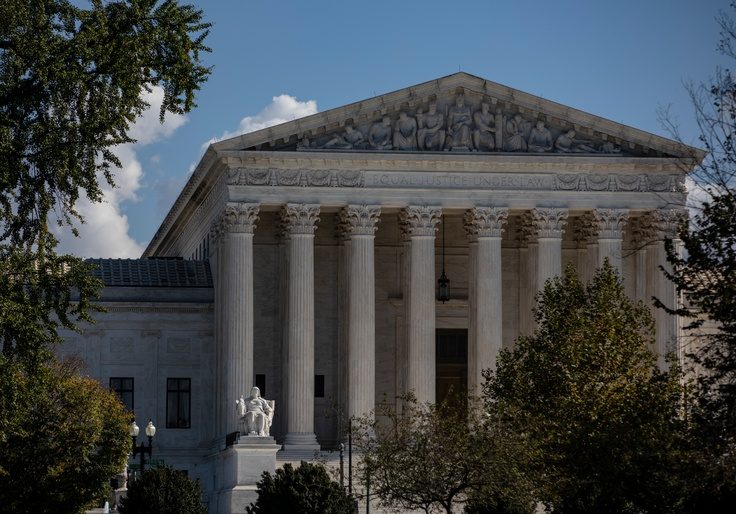In an early setback for the Biden Justice Department’s reform agenda, the Supreme Court on Monday unanimously held that low-level crack cocaine offenders aren’t eligible for lighter sentences under the 2018 First Step Act.
The decision came after Biden appointees at the Justice Department broke with their Trump-appointed predecessors to back small-time drug defendants seeking re-sentencing. Justice Clarence Thomas delivered the majority opinion that eight justices joined in full, a stark rejoinder to the government’s reversal.
The First Step Act made offenders convicted before 2010 of possessing large amounts of crack eligible for new, lessened sentences. Consistent with its criminal justice reform goals, the Biden Justice Department argued in Monday’s case that the First Step Act also covers low-level offenders. The verdict could impact several hundred federal offenders who were convicted before 2010 of possessing a small quantity of crack cocaine.
The Trump Justice Department initially argued that small-time convicts were not eligible for relief under the First Step Act. The Supreme Court agreed to weigh in on that issue on Jan. 8. Once Biden took office and installed new leadership at the Department of Justice, the department flipped positions and backed defendants seeking a lighter sentence under the act. The department notified the Court of its change one month before the argument—prompting a rare change to the Court’s schedule—on the same day it was due to submit its main legal brief.
The change was also notable because it put the Justice Department in the position of arguing for a defendant-friendly interpretation of a sentencing law. The flip prompted the Court to appoint an outside lawyer, Adam Mortara, to argue the position the government formerly held.
The scheduling foul-up made waves among the justices during oral arguments at a special session in May, and Monday’s lopsided result underscored the unusual nature of the department’s conduct.
Monday’s case emerged from a reappraisal of '80s-era drug sentencing practices. Between 1986 and 2010, crack cocaine offenses carried much stiffer mandatory penalties as compared to powder cocaine offenses, even though they are different forms of the same drug. In 2010, Congress passed a law to close the gap between mandatory crack and powder cocaine penalties.
The 2018 First Step Act went further and said the 2010 amendments would also apply to inmates who received mandatory minimum sentences before 2010. The defendant in Monday’s case, Tarahrick Terry, pled guilty in 2008 for possessing 3.9 grams of crack. Given the small quantity, Terry’s charge did not trigger a mandatory sentence, but he nonetheless argued the First Step Act entitled him to a lighter penalty.
In Monday’s decision, the Court said the 2010 and 2018 laws only covered offenders who possessed enough crack to trigger a mandatory minimum sentence. It did nothing for defendants, like Terry, who were convicted for possessing small amounts of crack cocaine.
"[Terry’s] offense is starkly different from the offenses that triggered mandatory minimums. The Fair Sentencing Act plainly 'modified' the 'statutory penalties' for those," Thomas wrote, adding that the result was a "straightforward" one.
The opinion also mentioned the administration’s position change, noting it came on the same day as an important deadline in the case, and it praised Mortara for "ably" discharging his assignment.
In a separate solo opinion, Justice Sonia Sotomayor said the text compelled the result the Court reached, which she said was an "injustice." She urged Congress to amend the First Step Act to the benefit of low-level offenders like Terry. She also faulted Thomas for giving a history of the crack-powder sentencing disparity she said was "sanitized."
"The bipartisan lead sponsors of the First Step Act have urged this Court to hold that the Act 'makes retroactive relief broadly available to all individuals sentenced for crack-cocaine offenses before the Fair Sentencing Act.' Unfortunately, the text will not bear that reading. Fortunately, Congress has numerous tools to right this injustice," Sotomayor wrote.
The Court’s decision put it on the other side of a large bipartisan coalition that hoped for a decision favoring Terry. Senate Majority Whip Dick Durbin (D., Ill.) and Sen. Chuck Grassley (R., Iowa) filed a brief supporting Terry, as did conservative and progressive advocacy groups like the American Conservative Union and the ACLU.
About 2,400 defendants were re-sentenced in the year after the First Step Act became law, according to the U.S. Sentencing Commission. The average sentencing reduction was about six years.
The Justice Department did not respond to inquiries by press time.
The decision is No. 20-5904 Terry v. United States.
